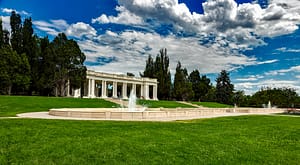Between hell-raisin’ gold rushers, US Army generals, warring Native American tribes and ‘unsinkable’ frontier women, Denver’s past is colorful and chaotic, and people here relish and romanticize the Wild West history. It was rumors of gold that brought the human tide to the Front Range in the middle of the 19th century and established Denver as a major supply point at the foot of the Rocky Mountains, but Arapaho and Cheyenne buffalo hunters already occupied hundreds of camps in the area.
General William H Larimer was the city’s white founder; in late 1859 he established a township at the confluence of Cherry Creek and the South Platte River and named it after the person who appointed the area to his control, Kansas Territorial Governor James W Denver. Without water or rail transportation, however, Denver’s overnight rise soon stagnated, ending the first of many boom-and-bust cycles that have defined the city’s growth.
Supplying gold and silver miners fostered the city’s boom until 1893, when the Silver Panic destroyed the economy and sent the state into depression. The following year discovery of gold deposits in Cripple Creek rejuvenated Denver’s stature as a center of finance and commerce. When this dried up it was coupled with the Great Depression.
In 1952, Denver’s 12-story height limit was repealed and the skyline sprouted high-rises, but many of these suffered during the mid-1980s when an office-construction boom went – you guessed it – bust. The cycle reversed yet again in the 1990s, and by the millennium Denver was a hub for computer, telecommunication and tech firms. Colorado’s important oil and gas industry went through similar cycles, riding the ups and downs of oil prices, conflicts overseas, and, most recently, the controversial spread of hydraulic fracturing, or fracking.
Denver gained a measure of national recognition in 2008, when it hosted the Democratic National Convention. But the attention was short lived, as the country careened into financial crisis. Denver weathered the Great Recession better than most cities, and has since emerged as a hot new destination – close to a thousand people relocate to Denver every week, and US & World Report named it the best American city to live in in 2016. The growth has brought fresh verve to Denver, bolstered by Colorado’s first-in-the-nation vote to legalize recreational marijuana. To top it off, the Broncos were Superbowl champs in 2016. The city faces predictable challenges, from traffic to housing prices, but its evolution into a first-tier city seems well underway.

